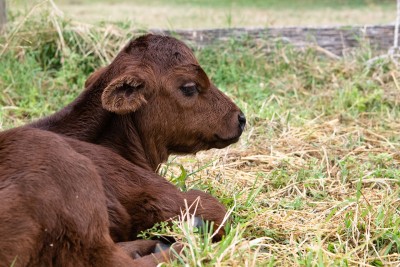Assessing (Beef) Calf Vigor, by Barry Whitworth, DVM

Assessing Calf Vigor
Barry Whitworth, DVM, Senior Extension Specialist, OSU Department of Animal and Food Sciences
In human medicine newborn babies undergo an APGAR test following birth. APGAR stands for appearance, pulse, grimace, activity, and respiration. The purpose of the test is to assess how well the baby tolerated the birthing process and how well the baby is doing outside the mother's womb. An APGAR test for calves similar to the one in human medicine would give cattle producers a clue when to intervene in a newborn's life. Unfortunately, most attempts to develop such a test for calves have not been successful; however, there are several studies that provide some practical advice on when to intervene with a newborn calf.
In two studies Dr. Homerosky and associates in Canada found two good predictors of calf vigor, calving ease and suckle reflex. Most producers have the ability to assess both components. First, was the calf born in a timely manner and required no assistance. Calves from births that require assistance are more likely to have acidosis. Acidosis is associated with failure of immunoglobulin absorption, sickness, and death in calves. Dr. Homerosky found a correlation between acidosis and the inability of a calf to withdrawal its tongue after being pinched. A producer can check a calf for acidosis by pinching the calf's tongue. If a calf cannot withdraw their tongue after being pinched, it is likely acidotic and is a good candidate for early colostrum intervention. Colostrum should be consumed in the first four hours following birth.
The second predictor a producers can check for is a strong suckle reflex. To measure the suckle reflex, a producer should insert two fingers in the mouth and rub the roof of the calf's mouth. A calf should have a strong jaw tone with a rhythmic suckle reflex. A weak suckle reflex indicates the need to feed colostrum.
In another study Dr. Murray found that calves that did not sit up (sternal recumbency) within 15 minutes of birth had reduced absorption of immunoglobulins. Also, calves born to cows that had difficulty birthing took longer to stand. These observations provide clues that the calf will require more care and colostrum intervention to increase the chance of survival.
Most producers are capable of assessing calf vigor based on the above parameters. Any calf born to a cow that has difficulty birthing and/or a calf that has problems with the above tests would be a candidate for early intervention. The best treatment is to give 2 to 3 liters of colostrum from the mother within the first 4 hours of life. Any delay in getting colostrum into the calf will only increase the chance of the calf having problems in life. This does require more work from the producer but should pay off with more pounds of beef at weaning.
References:
Homerosky ER, Caulkett NA, Timsit E, Pajor EA, Kastelic JP, Windeyer MC. Clinical Indicators of Blood Gas Disturbance, Elevated L-lactate Concentration and other Abnormal Blood Parameters in Newborn Beef Calves. The Veterinary Journal, January 2017 Vol.219: pp.49-57.
Homerosky ER, Timsit E, Pajor EA, Kastelic JP, Windeyer MC. Predictors and impacts of colostrum Consumption by 4H after Birth in Newborn Beef Calves. The Veterinary Journal, October 2017 Vol.218: pp.1-6.
Murray CF, Veira DM, Nadalin AL, Haines DM, Jackson ML, Pearl DL, Leslie KE. The Effect of Dystocia on Physiological and Behavioral Characteristics Related to Vitality and Passive Transfer of Immunoglobulins in Newborn Holstein Calves. Canadian Journal of Veterinary Research, April 2015 Vol.79(2): pp.109-119.
Upcoming Events
WNY Pastureland Conversion & Soil Health Field Day
July 16, 2025
Middleport, NY
Join American Farmland Trust for the Western New York Soil Health Field Day on July 16, 2025, at Zeliff Farm in Middleport, NY, from 9:00 AM-3:15 PM. Learn about pasture conversion, soil health benchmarking, biochar in grazing systems, and best grazing practices. Plus, enjoy hands-on demos with the NY Soil Health Trailer, drones, and cover crops! Check out the attached agenda for more information about the field day and REGISTER HERE. Zeliff Farms is a regenerative beef operation who has recently partnered with AFT on outreach and education to farmers including learning circles and evaluating biochar effects on soil health.
IPM Strategies to Protect Corn and Soybean Seed in NY
July 30, 2025
Hamburg , NY
SWNYDLFC and Cornell IPM are hosting a grower meeting to discuss integrated pest management strategies for protecting corn and soybean seed in New York.
FAMACHA Training for Sheep and Goat producers in Woodhull NY
August 13, 2025 : FAMACHA Training in Woodhull
Woodhull, NY
Join us for a discussion and hands-on training for internal parasite integrated pest management in sheep and goats. Certification is available to all students participating in the workshop.
Announcements
No announcements at this time.





